by GardenLover | Nov 17, 2014 | Books Notes
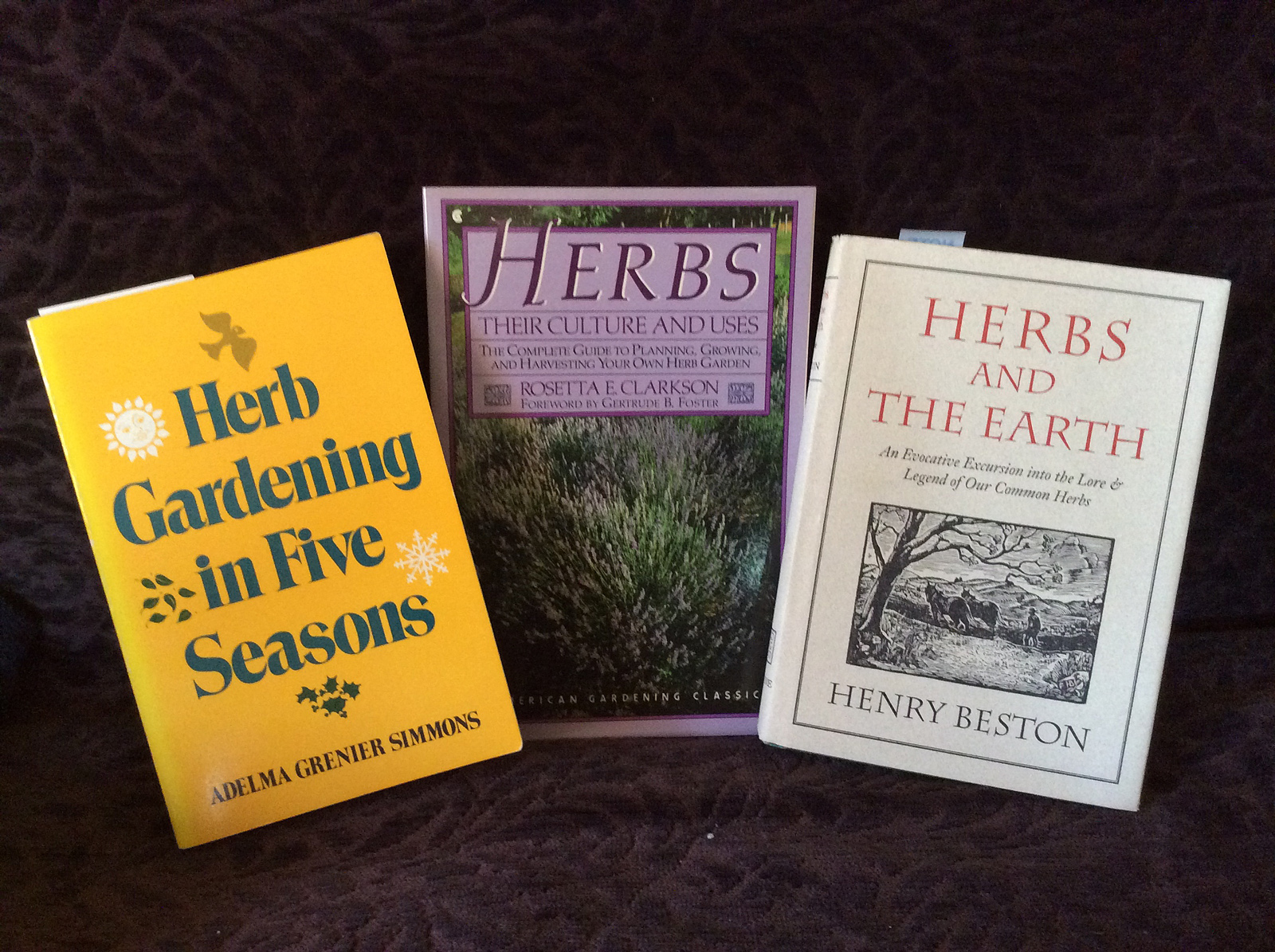 By Debra Knapke
By Debra Knapke
November is a time when I revisit books that are old, and sometimes forgotten, friends. We’ve all heard the dire pronouncements: books are becoming obsolete, the web is killing the publishing industry and more. Yet, in this time of early evenings, colder temperatures and even snow, it is a cup of tea and a good book that are my preferred companions at the end of the day.
![Adelma Caprilands[1]](https://debrathegardensage.com/wp-content/uploads/2014/11/adelma-caprilands1.jpg?w=510)
Adelma Grenier Simmons
How do we choose books? Often it is a catchy title that entices. Herb Gardening in Five Seasons by Adelma Grenier Simmons had me at the title. So what is the fifth season? A season that has a feeling all its own: Christmas. Adelma Simmons wrote this book in 1964 when herbs were beloved by gardeners, but they weren’t the mainstay of gardens as they are now. She brought herbs to the attention to many through her books and her extensive gardens, Caprilands, in Coventry, Connecticut. She influenced my herbal education greatly. Adelma died in 1997 at the age of 93, seven years after I read one of the many reprints of her book.
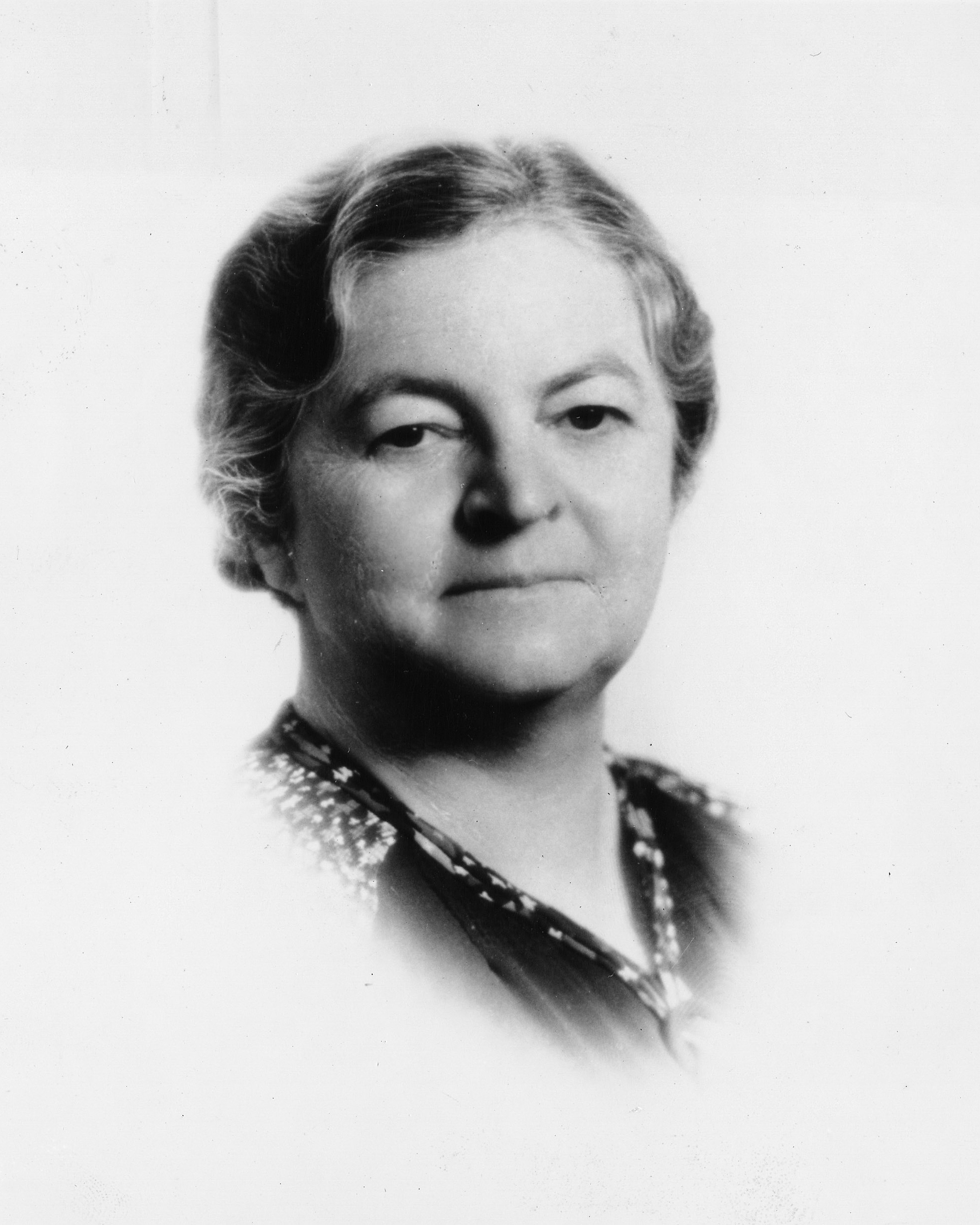
Rosetta Shear Clarkson
Still on my herbal journey, a year and a half later I found another classic, Herbs: Their Culture and Uses. Rosetta Clarkson penned three books. Magic Gardens (1939) and Green Enchantment (1940) preceded Herbs: Their Culture and Uses (1942). Her style of writing is very personal in all three books. While reading her instructions and advice I felt as if she was talking to me. Rosetta gardened just outside of New York City and along the coast of Connecticut. My favorite of her three books was Green Enchantment, but it has disappeared from my bookshelves; probably lent out and never returned.
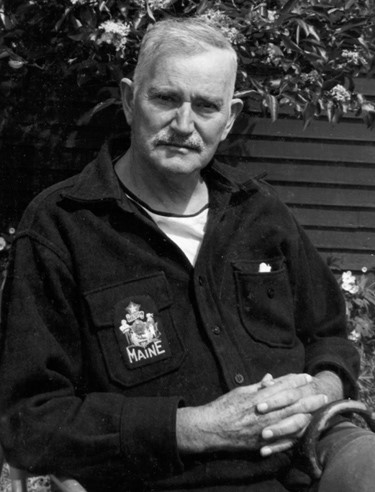
Henry Beston
In between these two authors I found and fell in love with another author whose poetic prose took me to the places he described. Another east coast writer, Henry Beston wrote Herbs and the Earth (1935) while on his farm in Nobelboro, Maine. He penned one of my favorite quotes –
“A garden is the mirror of the mind. It is a place of life, a mystery of green moving to the pulse of the year, and pressing on and pausing the while to its own inherent rhythms.”
And, I would like to offer you a quote from Adelma as you contemplate (dread?) the approach of winter:
“The quiet aloneness of winter has a special charm for the herb gardener, and I confess this season is my delight. Through the restless, rushing hours of spring, and the long days of summer that begin at dawn and end with weeding in the twilight, I find myself looking back at the peace of winter and forward to the next one. The winter landscape, bare and stringent, reveals a beauty of form and line that is not visible in the spring and summer.”
by GardenLover | Mar 19, 2014 | Books Notes, Spring countdown
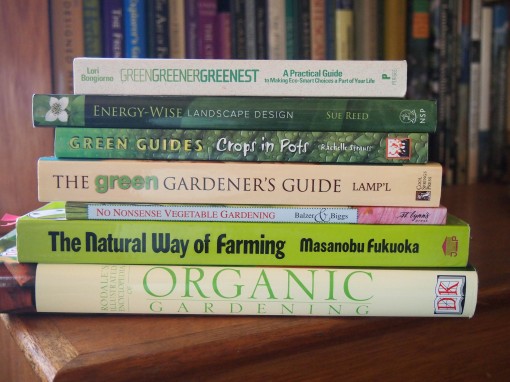 By Debra Knapke
By Debra Knapke
In keeping with the green-theme here is another set of books to consider. From bottom to top:
Rodale’s Illustrated Encyclopedia of Organic Gardening – I still have the original The Basic Book of Organic Gardening edited by Robert Rodale – a dense paperback that was published in 1971 and purchased by me in 1989 for $3.95. The pictured book was published in 2002 and has much of the same down-to-Earth information, but with lots of pictures. We like pictures…
The Natural Way of Farming: The Theory and Practice of Green Farming – This is a book that has become one of the bibles of the sustainable food movement. Parts are poetic; other parts are packed with process-thinking and science. If you are considering growing your own food organically, this book will give you a path to follow.
No Nonsense Vegetable Gardening – now for something on the quirky, but very fun, end of the spectrum… Donna Balzer and Steven Biggs travel through the issues of vegetable gardening with humor. Not everything is cut-and-dry and gardening is not rocket science.
The Green Gardener’s Guide: Simple, Significant Actions to Protect & Preserve Our Planet – Joe Lamp’l offers quick, yet informative, lessons on how to garden and how to work with nature. He stresses that you don’t have to do it all at once, just take one step at a time. Most topics are 2-3 pages long.
Green Guides Crops in Pots: Growing Vegetables, Fruit & Herbs in Pots, Containers & Baskets – For those of you who do not have the acreage for an in-the-ground garden but want to garden, here’s your book. The tips are very helpful and the sound-byte facts are thought-provoking; for example, “Did you Know? North America produces nearly 90 percent of the world’s blueberries.”
Energy-Wise Landscape Design: A New Approach for Your Home and Garden – I do have to take a stand with the word “new”, but the time-honored information is presented in a very attractive and easy to understand format. If you follow the recommendations, you will be saving energy, money and be part of the solution instead of being part of the problem.
And lastly, Green, Greener, Greenest: A Practical Guide to Making Eco-Smart Choices a Part of Your Life – This book goes beyond the garden, proposing options that are at different levels of action; your choice. As I tell my students, there isn’t always a best option, sometimes it boils down to: what is the least-worst?
by GardenLover | Jul 20, 2013 | Books Notes
 By Teresa Woodard
By Teresa Woodard
Step inside the Victorian language of flowers in this beautiful debut novel by Vanessa Diffenbaugh. Here, we meet 18-year-old Victoria Jones on her first day of emancipation from the foster-care system. In her first job at a florist’s shop, she discovers her gift of flower arranging and uses it to help change the lives of others even as she struggles to overcome her troubled past. Drawing on the Victorian language of flowers that she learned as a young girl from her prospective adoptive mother, she tucks messages inside her bouquets and in her exchanges with a secret admirer who shares her passion for flowers.
She eventually creates her own dictionary of flower photos and interpretations of the Victorian definitions, including several of those below.
- Aster – patience
- Forsythia – anticipation
- Jonquil – desire
- Lavendar – mistrust
- Marigold – grief
- Olive – peace
- Rose, red – love
- Rose, yellow – infidelity
- Rose, white – a heart unfamiliar with love
- Rosemary – remembrance (see Debra Knapke’s post)
- Stephanotis – happiness in marriage
- Sunflower – false riches
- Thistle – misanthropy (The flower Victoria chooses to describe herself.)
- Tulip – declaration of love
by GardenLover | May 9, 2013 | Books Notes
 The Seed Underground: A Growing Revolution to Save Food — Janisse Ray, Chelsea Green Publishing, 2012.
The Seed Underground: A Growing Revolution to Save Food — Janisse Ray, Chelsea Green Publishing, 2012.
Reviewed by Teresa Woodard
I am planting seeds today with a renewed appreciation for their diversity, cultural heritage and important role in our food supply – thanks to Janisse Ray’s compelling new book, The Seed Underground. This naturalist, activist and poet author encourages readers to be germinators and not terminators of our country’s seed supply and thus food supply. She cites a University of Georgia study that found 94 percent of the seeds offered a century ago are no longer available for today’s gardeners and farmers.
In this award-winning book, Ray describes seeds as “the most hopeful thing in the world”. Imagine a small acorn growing into an 80-foot oak or a bucket of seeds producing a bountiful crop to feed a family. In each chapter, she shares several anecdotes of seed savers – a hand-pollinator of squash, a tomato grower that trials some 1,000 varieties and a Saskatchewan farmer that battled a seed company all the way to the Canadian Supreme Court for alleged corn seed patent violations from “genetic drift”. Ray also adds how-to chapters on seed saving and personal stories from her garden in Southern Georgia.
by GardenLover | Jan 15, 2013 | Books Notes
Poetic Prose for Herbal Souls on a Wintery Day
 By Debra Knapke
By Debra Knapke
Here’s my first Book Note for 2013: Herbs and the Earth by Henry Beston, originally published in 1935.
A dear friend gave me the hardback Goodine Publisher edition (1990) in 1991. This is a book for a snowy day, a roaring fire and your favorite cup of tea. Henry Beston’s poetic prose draws you into the beauty of herbs and the mystery of life. When I read it the first time, I felt that I finally understood herbs and by association, the people who grow and love them. The second time, his words settled gently on my “herbal” soul. Periodically I pick it up and savor my favorite parts.
For the New Year, I would also like to share with you one of my favorite quotes:
“A garden is the mirror of a mind. It is a place of life, a mystery of green moving to the pulse of the year, and pressing on and pausing the while to its own inherent rhythms. In making a garden, there is something to be sought, and something to be found.”
by GardenLover | Nov 9, 2012 | Books Notes

Energy-Wise Landscape Design: a New Approach for your Home and Garden – Sue Reed, New Society Publishers, BC, Canada, 2010.
Reviewed by Debra Knapke
Sustainability, conserving energy and organic are the buzzwords of our time. And many claims of new techniques and products follow as communicators – writers, marketers, etc. – rush to support these concepts. While I am skeptical about claims of new approaches, I do appreciate constructive, concrete information on being energy-wise.
If you are creating your first garden or are reworking what you have, this book can guide your every step from designing a landscape to constructing it. All along the continuum of garden construction to garden maintenance, Sue Reed offers solid advice for the big picture such as constructing new home sites; and for the details such as construction hints, new products, water use, lighting the landscape and more. There are numerous sidebars that explain underlying concepts that are sometimes “black holes” in a gardener’s understanding of the many aspects of gardening and garden-making. I have other books that contain this information, but the focus of this book is loud and clear. You need to attend to the energy aspect of your home and garden. It not only conserves the world’s resources, it’s just plain, good sense.
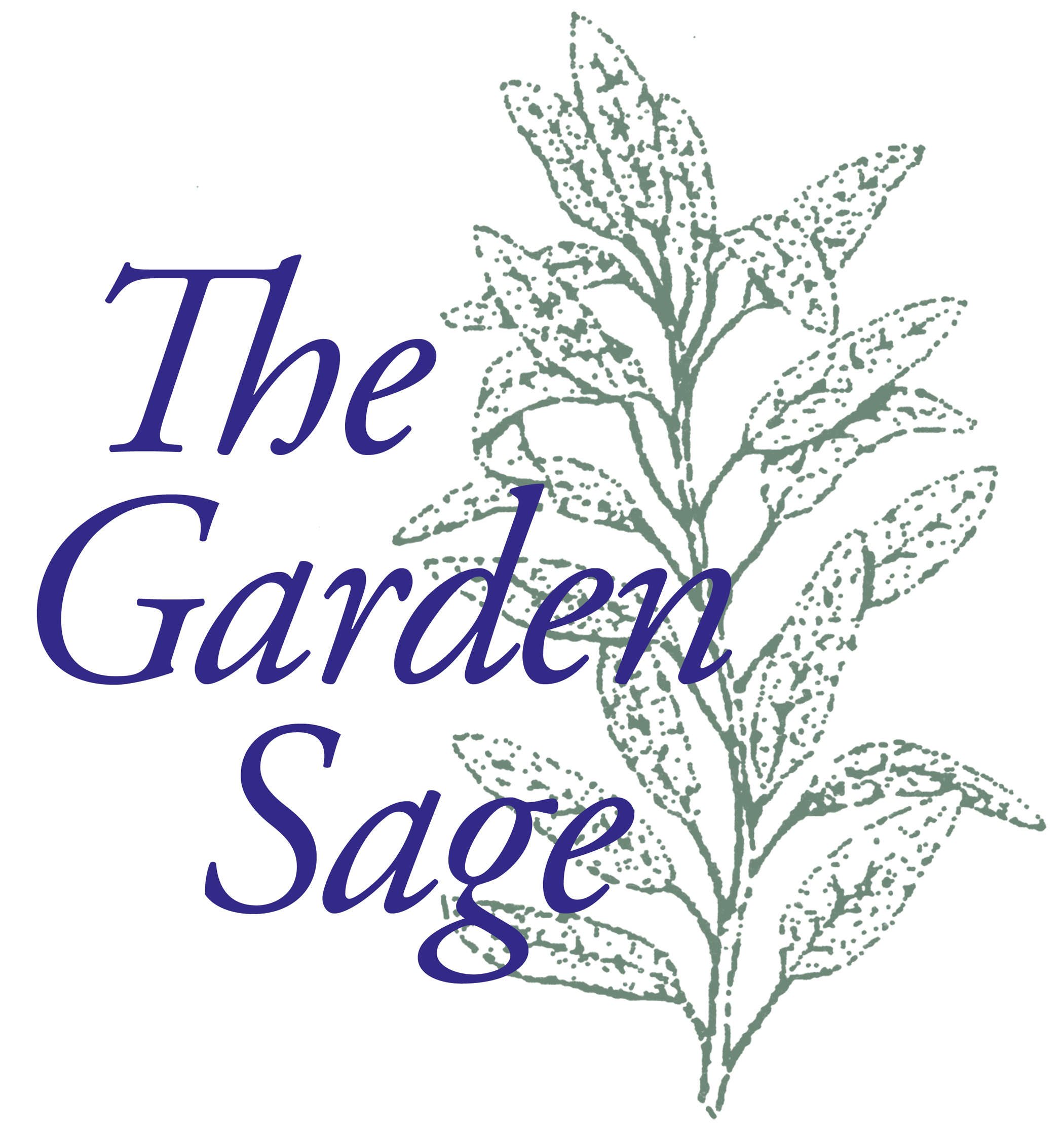

![Adelma Caprilands[1]](https://debrathegardensage.com/wp-content/uploads/2014/11/adelma-caprilands1.jpg?w=510)






